
Fraxinus americana, the white ash or American ash, is a fast-growing species of ash tree native to eastern and central North America.

Encyclopedia Americana is a general encyclopedia written in American English. It was the first general encyclopedia of any magnitude to be published in North America. With Collier's Encyclopedia and Encyclopædia Britannica, Encyclopedia Americana became one of the three major and large English-language general encyclopedias; the three were sometimes collectively called "the ABCs of encyclopedias". Following the acquisition of Grolier in 2000, the encyclopedia has been produced by Scholastic.
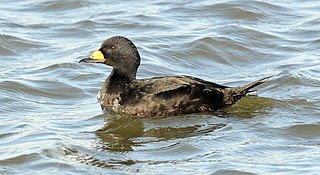
The black scoter or American scoter is a large sea duck, 43 to 49 cm in length. The genus name is derived from Ancient Greek melas "black" and netta "duck". The species name is from the Latin for "American".

The whooping crane is an endangered crane species, native to North America, named for its "whooping" calls. Along with the sandhill crane, it is one of only two crane species native to North America, and it is also the tallest North American bird species. The whooping crane's lifespan is estimated to be 22–24 years in the wild. After being pushed to the brink of extinction, due to unregulated hunting and loss of habitat, and just 21 wild cranes remaining by 1941, conservation efforts would lead to a partial recovery. The total number of cranes in the surviving migratory population, plus three reintroduced flocks and in-captivity, only slightly exceeds 800 birds as of 2020.

Agave americana, commonly known as the century plant, maguey, or American aloe, is a flowering plant species belonging to the family Asparagaceae. It is native to Mexico and the United States, specifically Texas. This plant is widely cultivated worldwide for its ornamental value and has become naturalized in various regions, including Southern California, the West Indies, South America, the Mediterranean Basin, Africa, the Canary Islands, India, China, Thailand, and Australia.

Sphaerites is a genus of beetles, the only genus in the family Sphaeritidae, sometimes called the false clown beetles. There are five known species, which are widespread in temperate areas of the Northern Hemisphere, found in forested or upland areas.

Persea is a genus of about 150 species of evergreen trees belonging to the laurel family, Lauraceae. The best-known member of the genus is the avocado, P. americana, widely cultivated in subtropical regions for its large, edible fruit.

The green kingfisher is a species of "water kingfisher" in the subfamily Cerylinae of the family Alcedinidae. It is found from southern Texas in the United States south through Central America, in every mainland South American country except Chile and Trinidad and Tobago.

Phytolacca americana, also known as American pokeweed, pokeweed, poke sallet, pokeberry, dragonberries, pigeonberry weed, and inkberry, is a poisonous, herbaceous perennial plant in the pokeweed family Phytolaccaceae. This pokeweed grows 1 to 3 metres. It has simple leaves on green to red or purplish stems and a large white taproot. The flowers are green to white, followed by berries which ripen through red to purple to almost black which are a food source for songbirds such as gray catbird, northern mockingbird, northern cardinal, and brown thrasher, as well as other birds and some small non-avian animals.

Bibionidae is a family of flies (Diptera) containing approximately 650–700 species worldwide. Adults are nectar feeders and emerge in numbers in spring. Because of the likelihood of adult flies being found in copula, they have earned colloquial names such as "love bugs" or "honeymoon flies".

Corylus americana, the American hazelnut or American hazel, is a species of deciduous shrub in the genus Corylus, native to the eastern and central United States and extreme southern parts of eastern and central Canada.
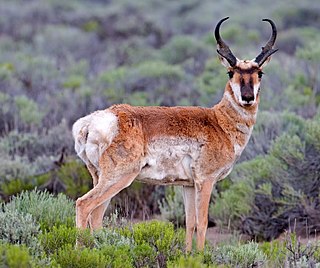
The pronghorn is a species of artiodactyl mammal indigenous to interior western and central North America. Though not an antelope, it is known colloquially in North America as the American antelope, prong buck, pronghorn antelope and prairie antelope, because it closely resembles the antelopes of the Old World and fills a similar ecological niche due to parallel evolution. It is the only surviving member of the family Antilocapridae.
Dendrothereua is a genus of house centipedes in the family Scutigeridae. There are at least three described species in Dendrothereua, found in the southern United States and the Neotropics.
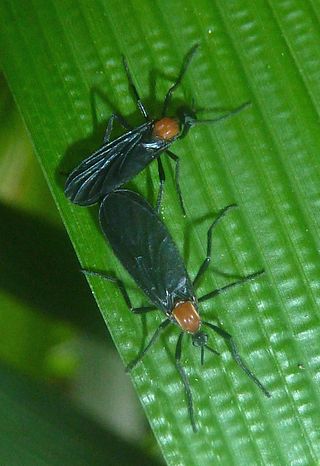
Plecia is a genus of March flies (Bibionidae) comprising many species, both extant and fossilised.

Skwala americana, commonly known as the American springfly, is a species of springfly in the family Perlodidae. It is found in North America.
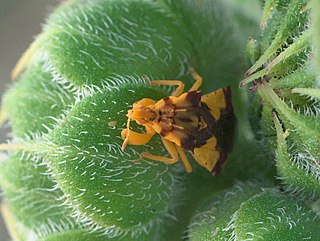
Phymata americana, known as the ambush bug, is a Phymatinae, or ambush bug in the family Reduviidae. It can be found on the flowers of various plants in Central America and North America, where it waits to prey on other insects.
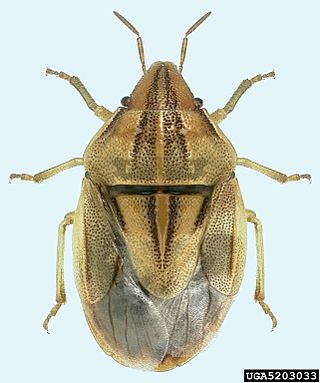
Aelia americana is a species of stink bug in the family Pentatomidae. It is found in North America.

The Pacific marten is a species of North American mammal, a member of the family Mustelidae. It is found throughout western North America.
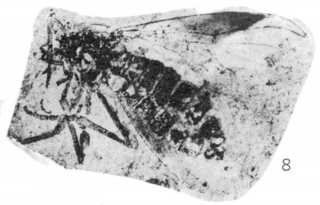
Plecia canadensis is an extinct species of Plecia in the fly family Bibionidae. The species is solely known from Early Eocene sediments exposed in central southern British Columbia. The species is one of twenty bibionid species described from the Eocene Okanagan Highlands paleofauna.
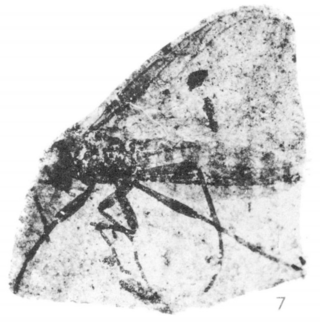
Plecia avus is an extinct species of Plecia in the March fly family Bibionidae and is solely known from Early Eocene sediments exposed in central southern British Columbia. The species is one of twenty bibionid species described from the Eocene Okanagan Highlands.




















